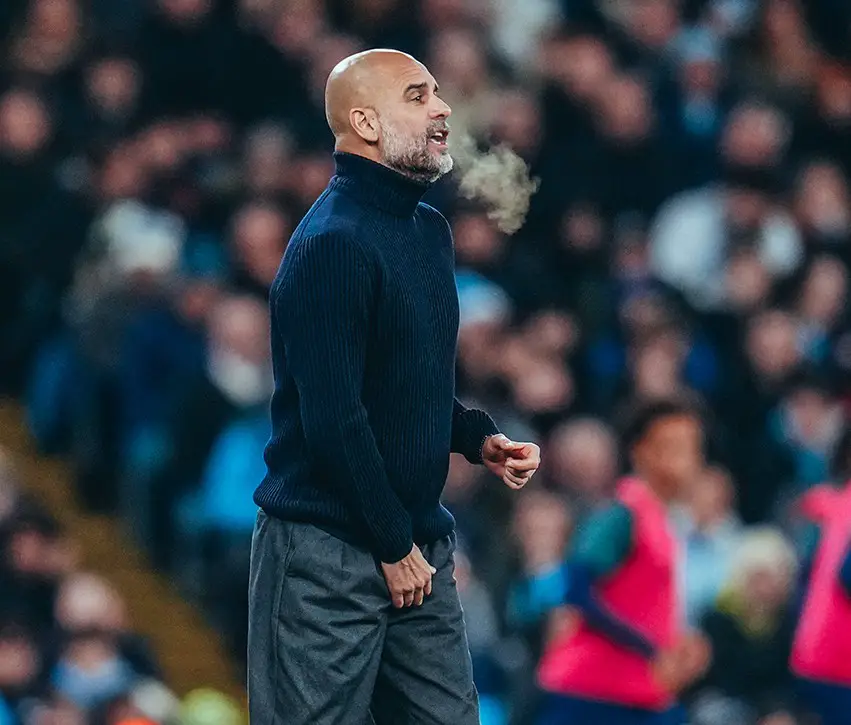
SOME MIXTURE OF the Covid Era and the lousy result means you’ll have likely memory-holed most of the details of Ireland’s previous trip to Wembley. You recall that Ireland were utterly overwhelmed in an empty stadium, and were easily beaten 3-0. But beyond that, does anything ring a bell? If Harry Maguire has scored an opening goal but nobody is there to have seen it.
..can it be said to have happened at all? The records show that Maguire did score, along with Jadon Sancho and Dominic Calvert-Lewin.
Not that anyone in England knows this: they recall that game for nothing other than Jude Bellingham’s senior debut, given he came off the bench with 17 minutes remaining. And not to start straying into grander territory than a football game here, but England have always had the luxury of forgetting what Ireland are fated to remember. That Wembley game and its preparation proved to be the black box for Stephen Kenny’s reign.
A history-inflected motivational video shown to the players by Stephen Kenny led to a fulminating controversy, at the end of which Damien Duff and Alan Kelly walked away from the set-up, for reasons they have yet to explain. Heimir Hallgrimsson has no plans to show his own motivational video. “If a national team player cannot motivate himself, he should not be in the national team”, said Hallgrimsson at his pre-match press conference.
Kenny’s problem was less the content of his video than the fact it leaked from the supposed sanctity of his camp. From that moment on he never fully shook the impression that he felt under siege; that every positive result was to be pointed to as a riposte to the critics, and every setback be fiercely defended or deflected. In this respect, Heimir Hallgrimsson cuts an entirely different figure to his predecessor.
He exudes a sense of security, which is unsurprising given that he is freighting the job with much less emotion than Kenny. Hence he was comfortable admitting that Ireland were lucky to beat Finland on Thursday; that Finland should have scored from at least one of their many presentable chances. “Thursday was not good enough performance to get something away from Wembley”, admitted Hallgrimsson.
Hallgrimsson has been clear, too, on why Finland had so many chances. Ireland’s midfield pair of Jason Knight and Josh Cullen were simply too enthusiastic in trying to make an impression, and thus pressed too wildly and individually and left massive gaps to be exploited. Enthusiasm is a euphemism for this issue: it might more accurately be termed indiscipline.
Regardless, Ireland cannot suffer the same problems today, but nor should they. This is not a game to chase with reckless abandon, but one largely to be survived: Hallgrimsson’s verbiage has given this much away. “Playing a game in our heads, it’s definitely going to be more possession England than Ireland and we just need to be aware of that fact”, he says.
“Don’t be too agitated in defence. We will need at times to suffer and do a lot of running without the ball and we just need to accept that.” Acceptance, Suffering, Forbearance.
..this is the stuff we are good at.
With Thomas Tuchel and Anthony Barry taking charge from next year, this is the final game of the Lee Carsley Interregnum, but this week has been treated by many of England’s stars as an intermission, such have been the number of withdrawals. Of the 14 players Gareth Southgate used in the Euro 2024 final in July, only Jordan Pickford, Kyle Walker, Marc Guehi, Bellingham, Harry Kane, and Ollie Watkins are available today. Kane was rested for England’s 3-0 win in Athens on Thursday, but Carsley is expected to return him to the starting XI against Ireland.
Kane generated headlines earlier this week when he bristled against the nine team-mates who withdrew from the squad before the Greece game, warning of potential damage to the squad culture. Also missing are two players uninvolved in that final: Trent Alexander-Arnold, who was left on the bench, and Jack Grealish, who was left at home. But in the absence of so many front-liners, England’s dazzling depth was on display in Athens, with Curtis Jones and Noni Madueke to the fore.
And in another needless testimony to England’s absurd options, none of the starting XI from the 3-0 win over Ireland in 2020 are in the squad now. Hallgrimsson has pointed out that Ireland are depleted too, missing 11 players in total, including the suspended Jason Knight. It was after the 2020 loss at Wembley that Kenny swapped to a back three, a system with which he broadly stuck and was maintained by John O’Shea during his caretaker stint.
That back three was retained for the September clash with England, when Hallgrimsson was still in observing mode. He saw enough in that 2-0 defeat to change it. “We played three centre-backs and I thought it didn’t work well enough”, says the manager.
“Since then we have played a back four and I think we have done better.” There have been subtle shifts, though. At home and away to Finland, Ireland shifted to a back three when they had the ball, with the left-back pushing high and wide.
Hallgrimsson says England also shift from a back four to a three when they have the ball, with the wide forward pushing high to pin back their direct opponent and a striker to provide a penalty box threat. That, says Hallgrimsson, leaves a quartet of midfielders to rotate and move where and when they like. “If we want to play man v man against them, it will be really tricky against them, with big spaces for talented players on the ball”, says Hallgrimsson.
“We would like to limit some spaces guide them to other spaces, and the formation will show what we want to happen during the game.” This principle is part of Hallgrimsson’s over-arching MO with Ireland which is, in his own words, “to be in charge of the game without possession.” This philosophy has been popularised by Jose Mourinho: where Guardiola’s Barcelona controlled the game with the ball, Mourinho said his Real Madrid team could control the game without the ball.
Ireland cannot finish anywhere other than third in this Nations League group, and so are heading for a promotion/relegation play-off next March. England, meanwhile, have to win to top the group and return to League A without the need for a March play-off of their own. While there is nothing material on the line for Ireland, they are playing to further enforce the belief and good feeling engendered by the wins over Finland, but also to give themselves a roadmap to taking points off whichever giant(s) they are landed with in World Cup qualifying.
“Let’s be honest, and just say it, there will be two teams higher ranked than us in the World Cup preliminaries and we will need to get points from these teams to qualify”, says Hallgrimsson. “That’s a fact. We need to learn how to play against these teams.
” In other words, Ireland’s ambition of this trip to Wembley is to condition whatever is to come. That’s precisely what happened the last time, of course, but let’s hope this time the auguries are more positive..














